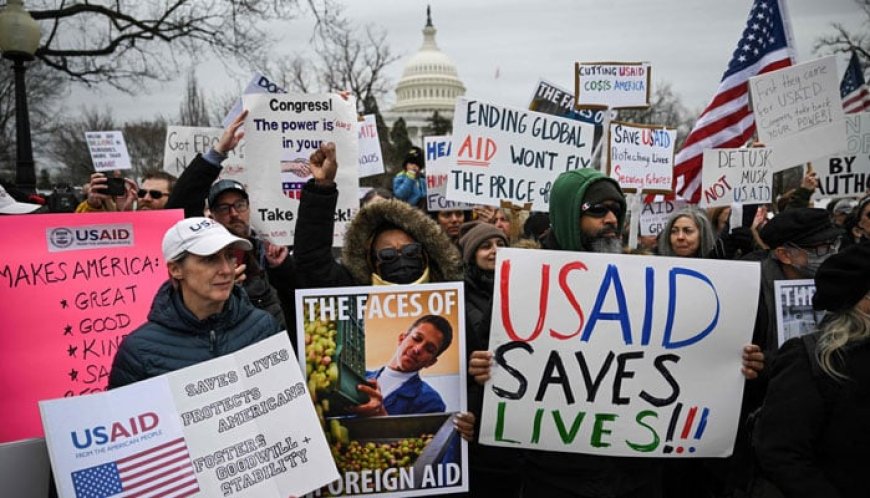Donald Trump's USAID shutdown disrupts global humanitarian efforts

1. US is by far the world's largest donor contributing $4 out of every $10 that goes to humanitarian aid
When the Trump administration began on January 20, Anne Lin was serving as the senior community health adviser at the President's Malaria Initiative (PMI), a program aimed at fighting malaria through the United States Agency for International Development (USAID).
With over two decades of experience across 30 sub-Saharan African countries, Lin found her work to be both essential and fulfilling.
However, within the first week of the new presidency, her career trajectory drastically changed.
On his first day in office, President Trump signed an executive order halting new commitments for US foreign aid, effectively pausing partnerships crucial to ongoing health initiatives. Four days later, a 90-day freeze was imposed on existing foreign development assistance, calling for a review of aid allocations and creating uncertainty among health professionals about the future of life-saving programs.
In a moment, Lin's work came to a standstill. Community healthcare workers in countries like Nigeria, Kenya, and Cameroon were forced to halt their activities, and supply chains for essential malaria medication were disrupted.
The websites for USAID and PMI went offline. By January 28, Lin and 390 other colleagues were laid off.
"I was stunned," Lin recalled. "I can't understand how anyone could justify such cruelty and waste."
"The entire sector, all the people I've known professionally, just disappeared with one stroke of a pen," she said, her voice shaking.
Children's lives at risk
The PMI website now displays a message stating that it is undergoing maintenance to comply with the President's Executive Orders, directing users to the USAID website.
As confusion spread, employees were informed that all USAID personnel, except for those handling critical functions, would be placed on administrative leave by February 7, 2025. Additionally, they were barred from entering the agency’s Washington, DC, headquarters.
The future of USAID was now in the hands of billionaire Elon Musk, tasked with improving its efficiency. Musk has publicly criticized the agency, labeling it a "criminal organization" and suggesting it was time to dismantle it.
As part of Lin’s role, she reported to Congress on the impact PMI had on malaria prevention, ensuring that funds were well-spent. Archived reports via the Wayback Machine show that since 2000, PMI helped save 11.7 million lives and prevented 2.1 billion malaria cases.
"Malaria is seasonal, and precise planning is critical for effective bed net distribution and children's preventive medicine," Lin wrote in a Facebook post that went viral. "Without this work, children will die unnecessarily."
Despite representing less than 1% of the US federal budget, foreign aid from the US accounts for 42% of all global humanitarian assistance, according to the UN. Now, those on the front lines and the civilians depending on these programs face an uncertain future.
Global systems providing life-saving aid for clean water, sanitation, and disaster relief have been severely disrupted. Many countries lack the funds to replace the gap left by the US.
Waivers and uncertainty
Acting USAID leader Secretary of State Marco Rubio issued a waiver to the global stop-work orders on January 29 for "life-saving humanitarian assistance," allowing limited funding to continue for medical supplies and food. However, many health and humanitarian groups, including Lin’s former colleagues, have not resumed their activities. Uncertainty lingers around which programs qualify for exemptions.
"It's a mess," said Jesse Marks of Refugees International. "There's no one available to answer questions about waivers."
Ukraine feeling the effects
In Ukraine, the Trump administration's aid freeze has also been met with shock. US foreign aid has supported various local programs, from health and education to energy and anti-corruption efforts, since Russia's full-scale invasion in 2022.
Denys Bihus, the director of Kyiv-based media outlet Bihus Info, noted that 65% of their funding came from USAID. With the freeze, Bihus admitted that they were now dependent on new subscribers and dwindling savings.
Bihus expressed concerns for other Ukrainian media outlets struggling to survive amid war and Russian occupation, stating that many regional teams, already under financial strain, may be forced to shut down.
Despite military aid continuing, Bihus emphasized that US funding for essential sectors like energy is crucial, particularly as Russia targets critical infrastructure.
"We will try to survive," he said. "But ask me again in a few months."

















































